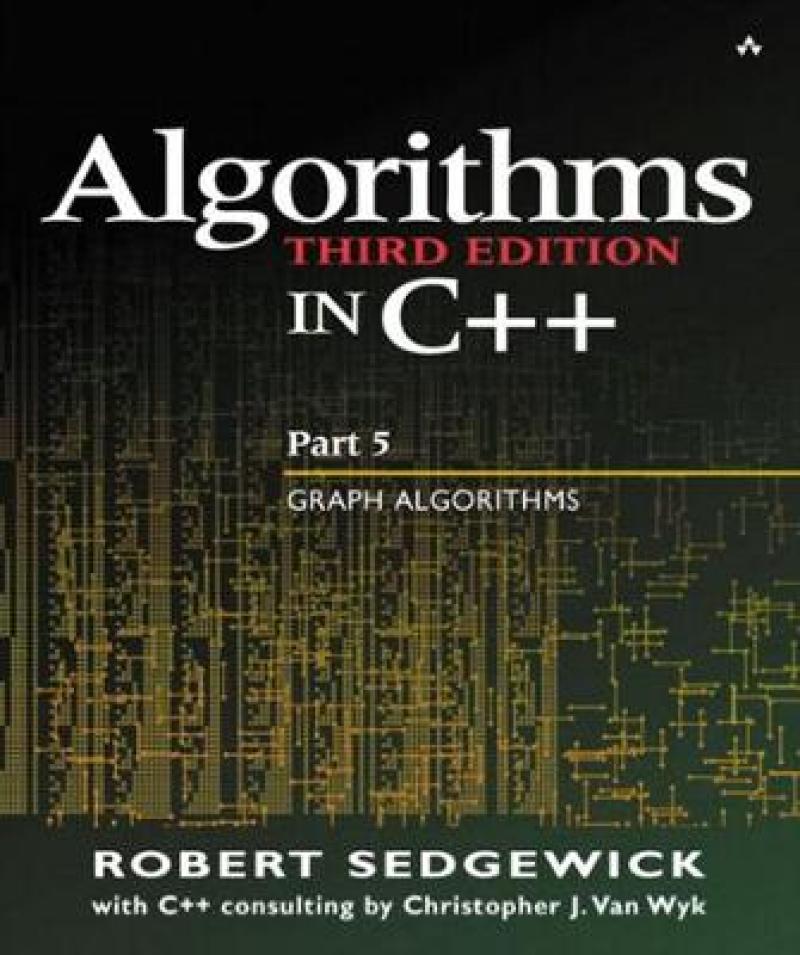Graph algorithms are critical for a wide range of applications, including network connectivity, circuit design, scheduling, transaction processing, and resource allocation. The latest in Robert Sedgewick's classic series on algorithms, this is the field's definitive guide to graph algorithms for C++. Far more than a "revision," this is a thorough rewriting, five times as long as the previous edition, with a new text design, innovative new figures, more detailed descriptions, and many new exercises -- all designed to dramatically enhance the book's value to developers, students, and researchers alike. The book contains six chapters covering graph properties and types, graph search, directed graphs, minimal spanning trees, shortest paths, and networks -- each with diagrams, sample code, and detailed descriptions intended to help readers understand the basic properties of as broad a range of fundamental graph algorithms as possible. The basic properties of these algorithms are developed from first principles; discussion of advanced mathematical concepts is brief, general, and descriptive, but proofs are rigorous and many open problems are discussed. Sedgewick focuses on practical applications, giving readers all the information and real (not pseudo-) code they need to confidently implement, debug, and use the algorithms he covers. (Also available: Algorithms in C++: Parts 1-4, Third Edition, ISBN: 0-201-35088-2).
Les mer
Providing exercises to help students learn the properties of algorithms, this text places a greater emphasis on abstract data types, modular programming, object-oriented programming and C++ classes.
17. Graph Properties and Types.
Glossary.
Graph ADT.
Adjacency-Matrix Representation.
Adjacency-Lists Representation.
Variations, Extensions, and Costs.
Graph Generators.
Simple, Euler, and Hamilton Paths.
Graph-Processing Problems.
18. Graph Search.
Exploring a Maze.
Depth-First Search.
Graph-Search ADT Functions.
Properties of DFS Forests.
DFS Algorithms.
Separability and Biconnectivity.
Breadth-First Search.
Generalized Graph Search.
Analysis of Graph Algorithms.
19. Digraphs and DAGs.
Glossary and Rules of the Game.
Anatomy of DFS in Digraphs.
Reachability and Transitive Closure.
Equivalence Relations and Partial Orders.
DAGs.
Topological Sorting.
Reachability in DAGs.
Strong Components in Digraphs.
Transitive Closure Revisited.
Perspective.
20. Minimum Spanning Trees.
Representations.
Underlying Principles of MST Algorithms.
Prim's Algorithm and Priority-First Search.
Kruskal's Algorithm.
Boruvka's Algorithm.
Comparisons and Improvements.
Euclidean MST.
21. Shortest Paths.
Underlying Principles.
Dijkstra's algorithm.
All-Pairs Shortest Paths.
Shortest Paths in Acyclic Networks.
Euclidean Networks.
Reduction.
Negative Weights.
Perspective.
22. Network Flow.
Flow Networks.
Augmenting-Path Maxflow Algorithms.
Preflow-Push Maxflow Algorithms.
Maxflow Reductions.
Mincost Flows.
Network Simplex Algorithm.
Mincost-Flow Reductions.
Perspective.
References for Part Five.
Index. 0201361183T12172001
Les mer
Graph algorithms are critical for a wide range of applications, including network connectivity, circuit design, scheduling, transaction processing, and resource allocation. The latest in Robert Sedgewick's classic series on algorithms, this is the field's definitive guide to graph algorithms for C++. Far more than a "revision," this is a thorough rewriting, five times as long as the previous edition, with a new text design, innovative new figures, more detailed descriptions, and many new exercises -- all designed to dramatically enhance the book's value to developers, students, and researchers alike. The book contains six chapters covering graph properties and types, graph search, directed graphs, minimal spanning trees, shortest paths, and networks -- each with diagrams, sample code, and detailed descriptions intended to help readers understand the basic properties of as broad a range of fundamental graph algorithms as possible. The basic properties of these algorithms are developed from first principles; discussion of advanced mathematical concepts is brief, general, and descriptive, but proofs are rigorous and many open problems are discussed. Sedgewick focuses on practical applications, giving readers all the information and real (not pseudo-) code they need to confidently implement, debug, and use the algorithms he covers. (Also available: Algorithms in C++: Parts 1-4, Third Edition, ISBN: 0-201-35088-2).
Les mer
Produktdetaljer
ISBN
9780201361186
Publisert
2002-01-16
Utgave
3. utgave
Utgiver
Vendor
Addison Wesley
Vekt
820 gr
Høyde
234 mm
Bredde
198 mm
Dybde
20 mm
Aldersnivå
05, U
Språk
Product language
Engelsk
Format
Product format
Heftet
Antall sider
528
Forfatter
